What we found in 14 years worth of Google searches on Israel and Palestine
Using an anonymised sample of search terms starting from 2004, AJLabs wanted to find out what the world wants to know about Israel and Palestine.

This year marks 70 years since the expulsion of more than 700,000 Palestinians from their homes and the subsequent establishment of the state of Israel. Depending on your point of view and interest in this topic, you’ll probably either be searching for “Nakba” (Catastrophe) or “Israel independence”.
How people search for information about a particular event can tell us quite a lot about their perceptions and attitudes towards various topics. Google Trends, the world’s largest repository of real-time search results, provides a window into the trillions of searches the world Googles each year.
Using an anonymised sample of search terms starting from 2004, we wanted to find out what the world wants to know about Israel and Palestine.
Data in context:
One of the most important things about drawing conclusions from data is using it within context. There have been several embarrassing moments where Google Trends data has been used to draw the wrong conclusions. To avoid comparing apples to oranges, Google normalises each of their search terms to control for search volume, time and location. This means that every search term is measured on a scale from 0 (no interest) to 100 (most interest) over a specified period of time and from a particular location. It is a relative measurement, and it keeps things constant.
Top Keywords:
We started off by trying to find the top keywords associated with Israel and Palestine. After searching through dozens of different keywords we found that the most frequently used terms in English were: Israel, Jerusalem, Palestine and Gaza. Here’s a graph of the global searches for these keywords since 2004:
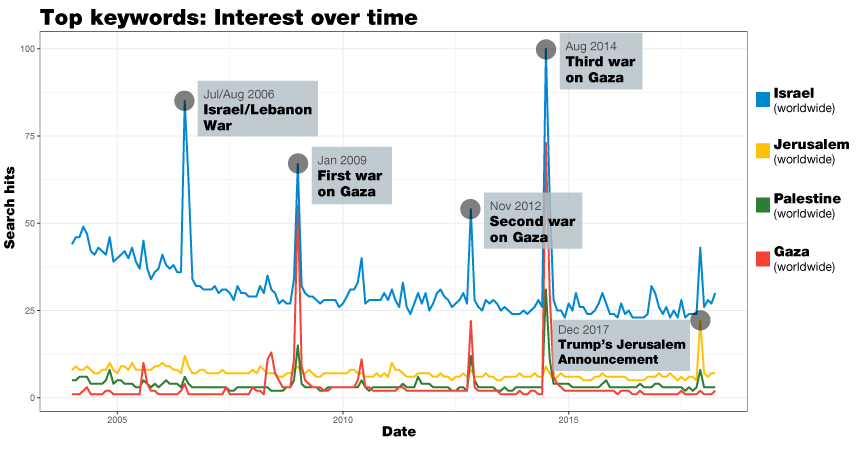
What the data tells us:
- Israel (indicated in blue) quite clearly dominates in global search terms -followed by Jerusalem (yellow), Palestine (green) and then Gaza (red).
- Unsurprisingly, major spikes coincide with major news events. These spikes are: 2006 (Israel/Lebanon war), 2008 (First war on Gaza), 2012 (Second war on Gaza), 2014 (Third war on Gaza) and 2017 (Trump’s Jerusalem announcement).
- During the wars, searches for the term “Gaza” quite clearly outweighed searches for “Palestine”. This is a well-known SEO observation, where people tend to search for the specific location of an event more than the country in which it took place.
One thing to keep in mind is that context really matters when looking at these charts. To create a benchmark we added a few unrelated search terms.
Compared to Syria:
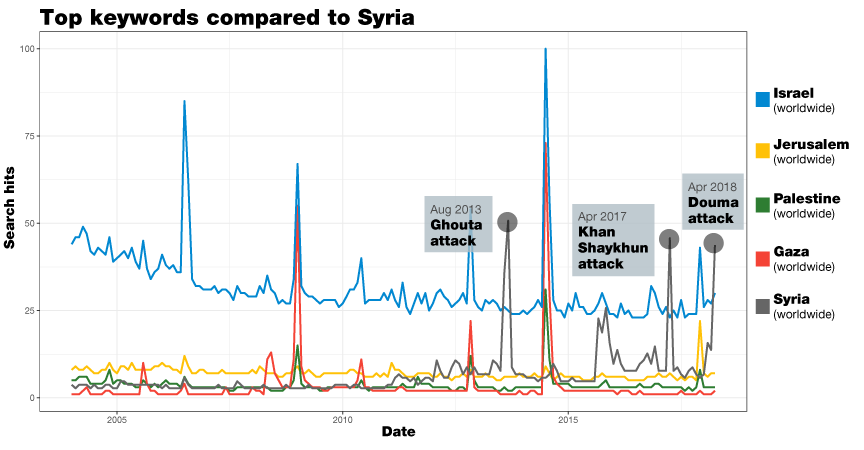
The war in Syria began in 2011, but the first major spike in search interest began on August 21, 2013, following the Ghouta chemical attack and peaked 10 days later following discussions of military intervention (“red lines”) in Syria by the US and its allies. The other two spikes were in April 2017 and April 2018 respectively, both following US-led military responses to chemical attacks in Khan Shaykhun and Douma.
Compared to football:

Football is a great example of a seasonal pattern. People search for football a lot more during football season than during any other time of the year. Also, depending on where you’re from, football may mean American football or soccer.
Compared to Trump:
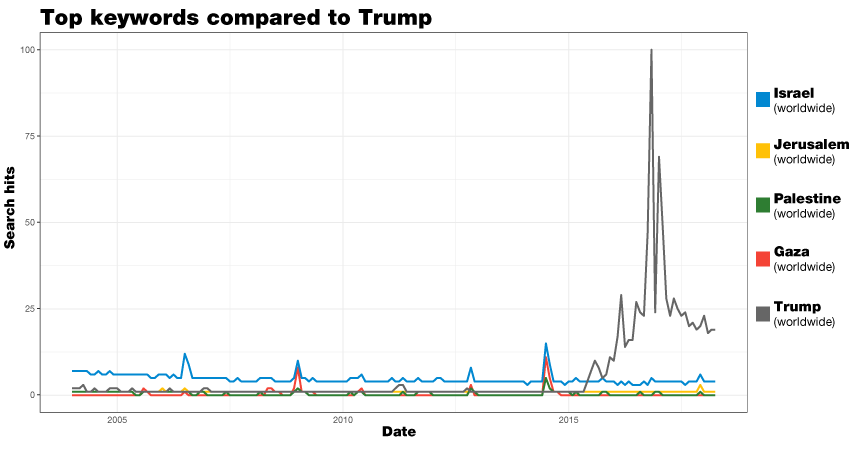
Searches for “Trump” spiked in November 2016, when he won the US presidential elections, and again two months later during his inauguration. Searches for the US president continue to dwarf any search terms in the Middle East.
Compared to Facebook:
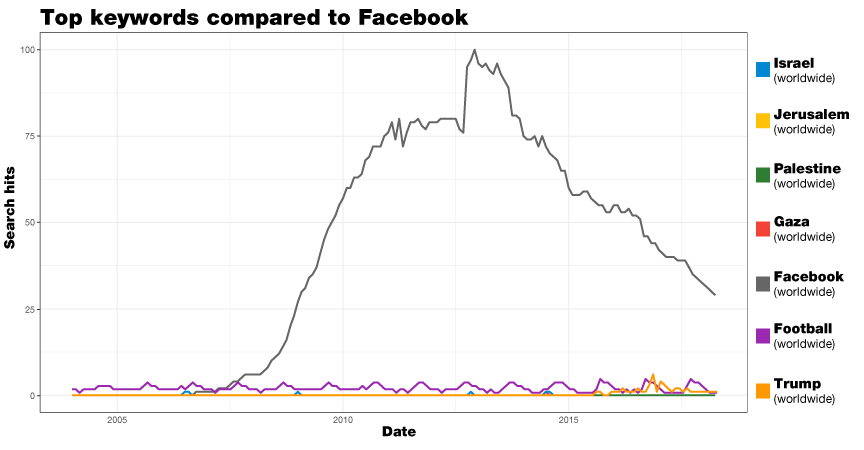
You might need a magnifying glass to find Israel and Palestine in there. Searches for Facebook peaked in 2012, and while interest has gradually declined over the past few years, the social networking giant still attracts more searches than even the largest sporting events.
Back to the Middle East, here are the top related search terms for the four keywords mentioned above.
Top related queries:
Israel: israel news, israel palestine, palestine, map israel, beth israel*
Jerusalem: jerusalem post, jerusalem israel , israel, hotel jerusalem , weather jerusalem
Palestine: israel palestine, israel , palestine tx*, israel and palestine, palestine map
Gaza: israel gaza, israel, bas, bas gaza*, gaza strip
If you’re not familiar with “beth israel”, “palestine tx” or “bas gaza”, that’s because those search terms mean something else in different locations and languages.

“Beth Israel” (House of Israel) is a name given to numerous synagogues and medical centres around the US.
“Palestine TX” is a town in Texas with a population of around 20,000 people.
If you’re from Turkey, you’ll know that “Bas Gaza” (step on the gas) was a popular pop album released in 2008 by Ismail YK.
Digging deeper:
The next step was to search for pairs of keywords that frequently come up during discussions of Israel and Palestine.
One vs. Two-state solution
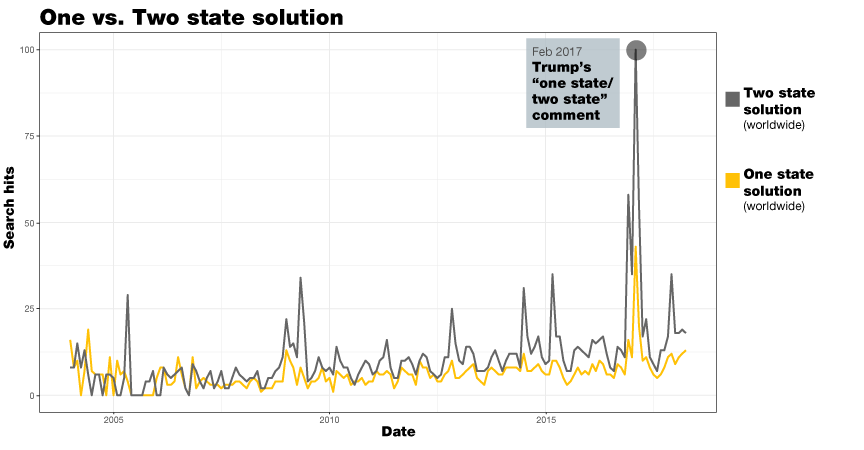
Searches for “two-state solution” – the idea of Israel and Palestine living side-by-side – generally outweighed searches for “one-state solution“. Notice, however, the large spike in February 2017. This follows Donald Trump’s comments on how he would be happy with either solution, thereby reversing his country’s position on the matter which has been the bedrock of US diplomacy for the past two decades.
Israel Independence vs. Nakba
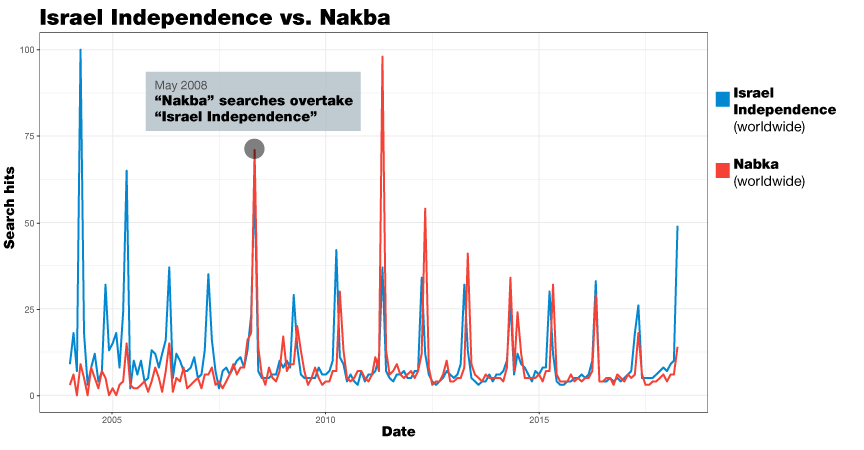
Global searches for “Israel Independence” outranked searches for “Nakba” during the first four years of Google’s sample dataset.
However, in 2008, which was the same year Al Jazeera’s Nakba documentary aired, the keyword “Nakba” on average outperformed searches for “Israel independence“, “Israeli independence” and “Independence day Israel“.
One interesting observation that you might notice in this seasonal pattern is that “Israel Independence” typically spikes 2-3 weeks before the May 15 anniversary which correlates with the Hebrew calendar.
Intifada
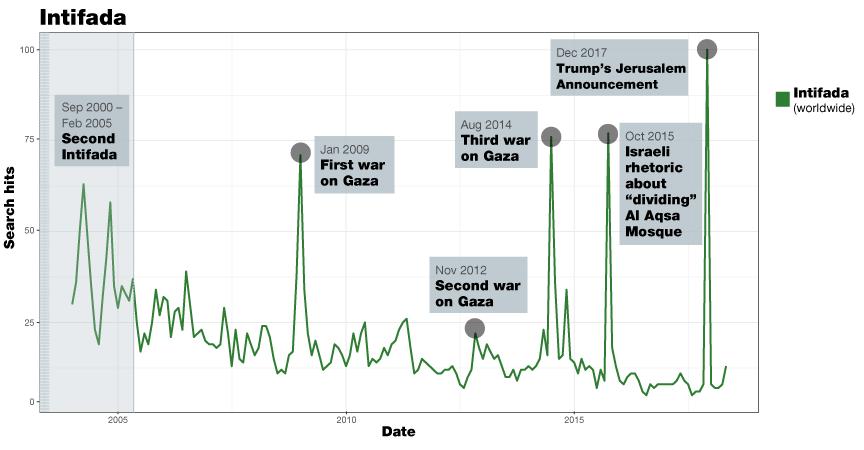
Searches for the keyword “intifada” (which translates to Palestinian uprising) spiked on five different occasions:
- 2004, during the Second Intifada
- 2008/9 war on Gaza
- 2014 war on Gaza
- October 2015, after Israeli rhetoric about “dividing” Al-Aqsa Mosque
- December 2017, the highest spike, following Trump’s announcement to move the US embassy from Tel Aviv to Jerusalem
Flags
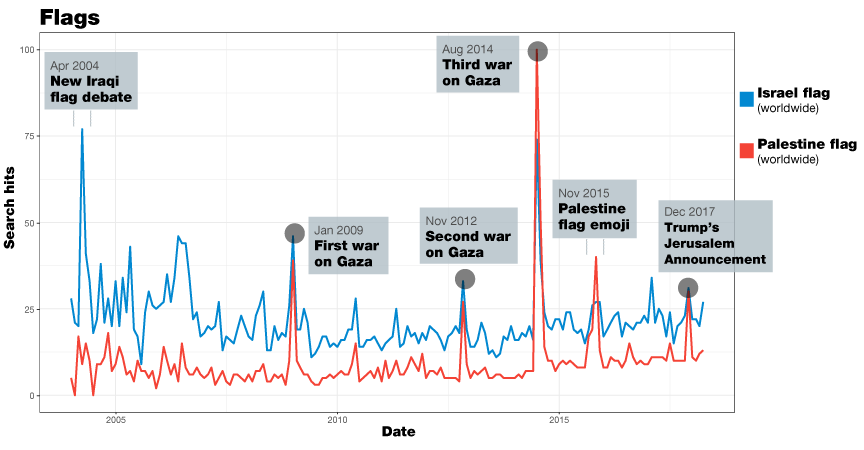
Globally, there are roughly twice as many searches for “Israel flag” than “Palestine flag“. During times of war, these search terms tend to spike with the third Gaza war being the first time interest in “Palestine flag” out-performed “Israel flag”. Two other interesting observations are the spikes in April 2004 and November 2015. The former was around the time a new Iraqi flag was unveiled which many said resembled the Israeli flag. Related searches at the time for “new Iraqi flag” suggests that this may be behind the spike. The other interesting observation was the spike in November 2015, which was a few months after the release of the Palestinian flag emoji on iOS 9. During this time, search interest for “Palestine flag emoji” also increased,which may have accounted for the overall rise in interest.
Jerusalem

One of the more timely search queries was comparing searches for the word “Jerusalem” in English, Arabic and Hebrew.
As you can see from the chart, the English and Arabic searches for “Jerusalem” both spiked in December 2017 following Donald Trump’s announcement that the US would move its embassy from Tel Aviv to Jerusalem. What’s interesting to note, however, is that there isn’t a similar spike during that time period in Hebrew.
Major news events:
Next, we wanted to measure the lifespan of major news events by plotting the main keywords over time.
1. Death of Yasser Arafat [2004/11/11]

- Top keywords: Arafat (in English and Arabic), Abu Ammar (in English and Arabic).
- The large spike in November 2004, matches the former Palestinian political leader’s hospital admission and subsequent death. Nowadays, searches for “Arafat” return different results. The seasonal spikes coincide with the annual Hajj – when millions of Muslim pilgrims gather at Mount Arafat in Mecca. However, outside of Hajj season, the top related search query for Arafat actually goes to DJ Arafat, a well-known DJ and singer from the Ivory Coast.
2. Lebanon War[ 2006/07/12 — 2006/08/14]

- Top keywords: Israel, Lebanon, Hezbollah
- The next major news event was the 2006 Lebanon War. Searches for Israel, Lebanon and Hezbollah were at some of their highest levels during this 34-day conflict. These three search terms peaked during the first few days of the war and returned back to their normal levels roughly two weeks after the end of the war.
3. First Gaza war[ 2008/12/27 — 2009/01/21]
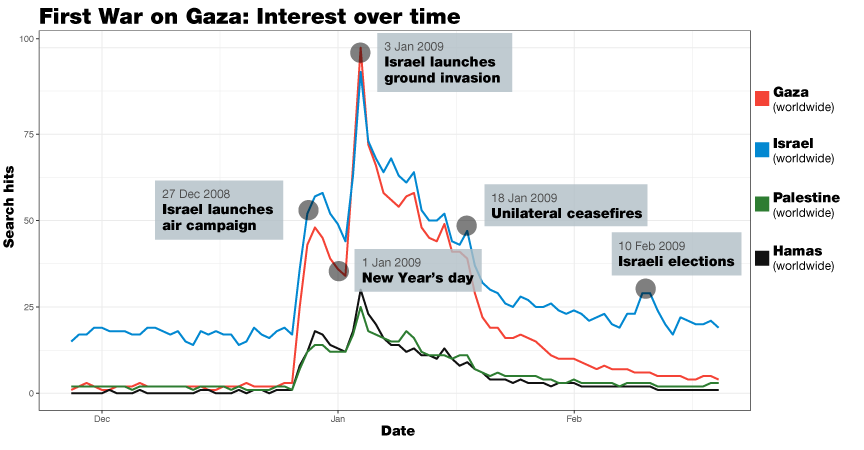
- Top keywords: Gaza, Israel, Palestine, Hamas
- The three-week war on Gaza saw a delay in global search interest. While searches did spike immediately following Israel’s air campaign, interest in the topic dipped and then rebounded following Israel’s ground invasion just after New Year’s day. Searches for the main keywords sustained global interest for at least a month after the end of the war in January 2009.
4. Second Gaza war [2012/11/14 — 2012/11/21]
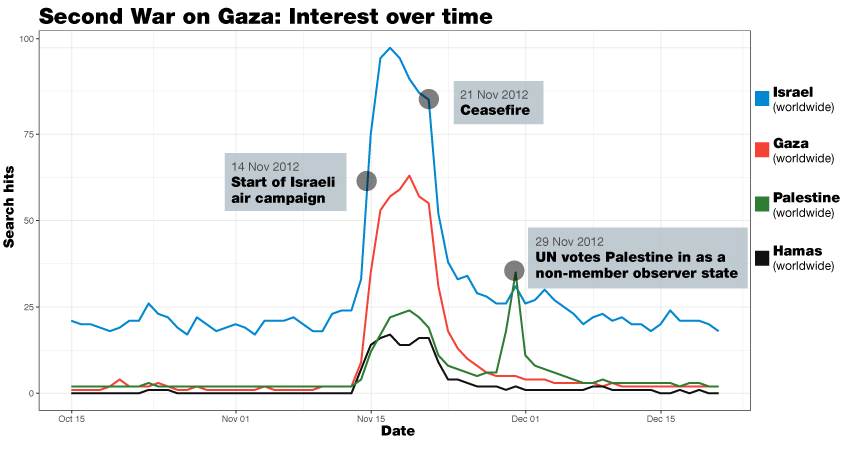
- Top keywords: Israel, Gaza, Palestine, Hamas
- Being the shortest of the three Gaza wars, the 2012 assault also received the lowest global curiosity. Search queries for “Israel”, “Gaza” and “Hamas” quickly returned to their pre-war levels. Searches for “Palestine” would spike one more time in November, when the United Nations General Assembly voted by an overwhelming majority – 138 in favour to 9 against – to recognise Palestine as a non-member observer state.
5. Third Gaza war[ 2014/07/08 — 2014/08/26]
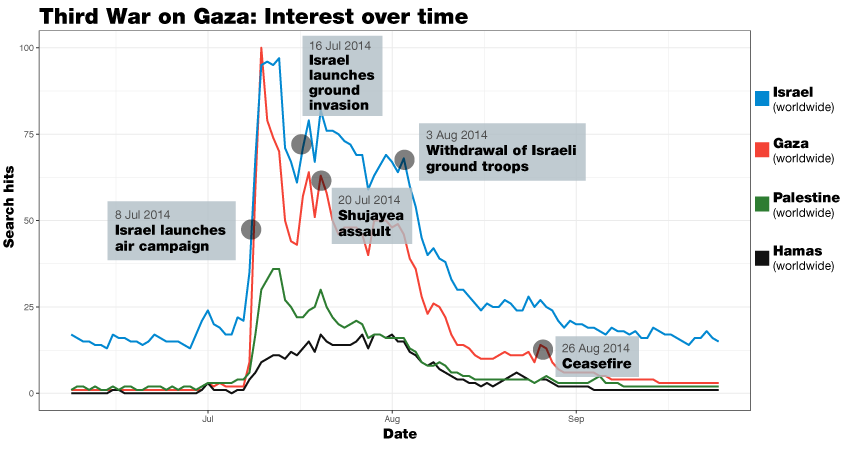
- Top keywords: Israel, Gaza, Palestine, Hamas
- The longest and deadliest of the three wars, the 2014 war on Gaza saw several peaks in global interest over the seven-week-long assault. As with the first Gaza war, searches for “Gaza” outranked searches for “Israel” at its peak. What’s interesting to see is how global search interest rapidly decreases following the August 3 withdrawal of Israeli troops. While gradually declining, search interest remained fairly steady in the month following the war as reconstruction efforts began.
What your country searches for
Lastly, we wanted to find out which countries around the world search more for “Israel” and “Palestine” in the country’s most widely spoken language.
This does not measure a country’s official position or public support for Israel or Palestine, but it can give you a glimpse into how interested people from within those countries are about these topics.
To calculate this, we used Google Translate to find the spellings of “Israel” and “Palestine” for the 166 countries listed by Google. In order to then rank the countries, we calculated the ratio of the average number of searches for “Israel” and “Palestine”.
Countries with little to no data were excluded. The result was 140 countries listed from most relative searches for “Israel” to most relative searches for “Palestine”.
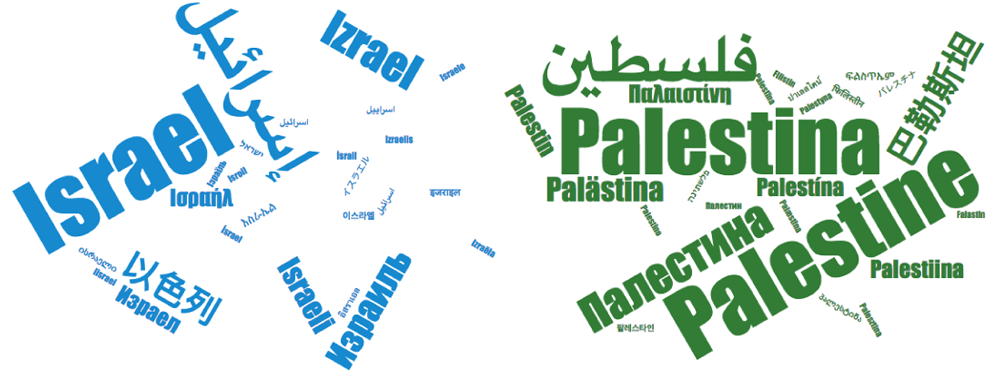
Perhaps unsurprisingly, Israelis have the highest ratio of searches for Israel (in Hebrew) and Palestine has the highest ratio of searches for Palestine (in Arabic). The country with equally as much interest for “Palestine” and “Israel” was Pakistan (in Urdu).
Most countries around the world search for “Israel” more than “Palestine”. On the higher end of the scale, 21 out of the 140 countries sampled, searched for “Israel” on average at least 10 times more than “Palestine”. In the middle of the pack are countries that on average search for “Israel” at least five times (high ratio), twice as many (moderately high ratio) and nearly equally as many (slightly higher ratio) times as “Palestine”.
On the other end of the spectrum, 22 countries around the world on average searched for “Palestine” more than “Israel”.
To provide a bit more context, we included three data sets which may be used to measure a country’s general attitude towards Israel and Palestine. These include countries with direct flights to Israel, countries whose citizens can travel to Israel visa-free and the results from the 2017 UN Jerusalem vote rejecting the US decision to recognise Jerusalem as Israel’s capital.
The table below presents these results:

Conclusion
It’s always fascinating to see what people are searching for, as it provides a window into the different worldviews prevalent in different countries.
What’s most evident from the hundreds of keyword searches, is that a strong online presence and owning one’s narrative online go hand-in-hand.
Follow Mohammed Haddad on Twitter .
To read more about @AJEnglish‘s data, visual storytelling and experiments team, follow us on Medium , Twitter and Instagram or visit our project webpages:
/indepth/interactive/documentaries
Are you a developer? Download the code for this project in R .